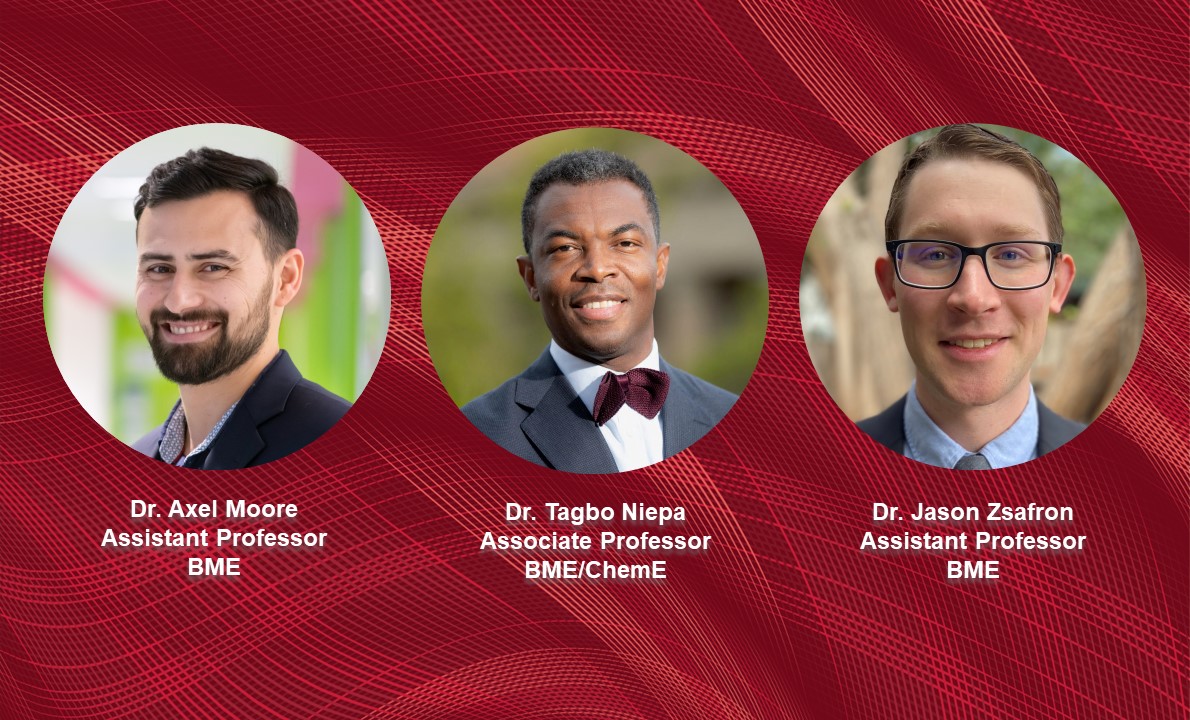
Welcoming Three New Faculty Members
Carnegie Mellon University’s College of Engineering is proud to welcome three new faculty members who joined the Biomedical Engineering department in the 2023-2024 academic year. The trio brings expertise in orthopedic biomechanics, bacterial engineering, and cardiovascular mechanobiology.
Axel Moore
Dr. Axel Moore, an assistant professor of biomedical engineering, joined the department in August 2023. With a Ph.D. in Biomedical Engineering from the University of Delaware, Moore's research focuses on understanding how structural materials in the human body—such as bone, cartilage, and intervertebral discs—grow, adapt, repair, and fail under various conditions. His lab uses a combination of biomechanics, robotics, and medical imaging to study these material systems.
Moore's research aims to guide healthcare practices to prevent, delay, and diagnose osteoarthritis. In the area of cartilage and arthritis, he explores the impact that activities such as walking and running have on our cartilage. His lab studies how we should move in terms of duration, frequency, and intensity, and investigates early diagnostic methods for cartilage disorders. In the field of spine and scoliosis, his primary goal is to reduce the re-operation rate for adolescent idiopathic scoliosis by understanding the relationship between force and curvature correction. Additionally, he assesses the potential recovery of spinal tissues following corrective measures.
Honored as the 2022-2023 Inaugural Houder Fellow in Pediatric Spinal Deformity at the Children’s Hospital of Philadelphia, Moore's groundbreaking research on growth modulation in spinal deformities underscores his commitment to advancing orthopedic biomechanics.
Tagbo Niepa
In July 2023, Dr. Tagbo Niepa, became an associate professor with a joint appointment in chemical and biomedical engineering. His educational background includes a Ph.D. in chemical engineering from Syracuse University.
Niepa's lab focuses on three main research areas. Firstly, they are developing alternative methods for antibiotics to combat drug-resistant pathogens. Using physical-chemical factors like electrical currents, nanoparticles, and nanomaterials, they aim to create surfaces that can be activated to eradicate microbes and address the challenge of drug resistance.
Secondly, Niepa's group examines interfacial biofilms, particularly in fluid interfaces where biofilms form. Investigating these overlooked areas that are rich in energy, his team explores how interfacial phenomena activate bacteria to generate new materials. This research spans applications from environmental benefits, like cleaning up oil spills, to potential concerns, such as harmful materials inside the lungs of cystic fibrosis patients.
In the third area, Niepa's lab is pioneering the replication of the human microbiome by encapsulating microbes. Specifically, his group is designing a system to extract and store an individual's microbiome when healthy for subsequent use during illness. This innovative approach not only advances our understanding of microbiota, but also minimizes the risk of cross-contamination, as patients become their own transplant donors.
In 2022, Niepa received the prestigious National Institutes of Health Director's New Innovator Award to support unconventional approaches to major challenges in biomedical and behavioral research. He has also been honored with a Faculty Early Career Development (CAREER) Award from the National Science Foundation (NSF).
Jason Szafron
Joining CMU in January 2024 as an assistant professor of biomedical engineering, Dr. Jason Szafron brings a wealth of knowledge from his biomedical engineering Ph.D. earned at Yale University.
Szafron's research goal is to develop simulation tools for predicting and improving treatment options for fetal, pediatric, and adult cardiovascular diseases. His lab's particular focus on congenital heart disease, pulmonary vascular disease, and fetal growth restriction integrates mechanobiological and immunological factors to understand disease progression and treatment. Additionally, he employs an experimental-computational approach to biomechanical modeling, informed by in vivo experimental data, to enhance understanding and treatment planning for cardiopulmonary diseases.
As the 2022-2025 Parker B. Francis Fellow, Szafron’s commitment to advancing research in pulmonary and respiratory diseases aligns with the Francis Family Foundation's mission to foster breakthrough solutions in pulmonary medicine.
We anticipate the significant contributions these three faculty members will bring to the department's research thrusts in orthopedics biomechanics, bacterial engineering, and cardiovascular mechanobiology. Their diverse expertise promises to elevate our department to new heights, while fostering cutting-edge research and nurturing the next generation of biomedical engineers.